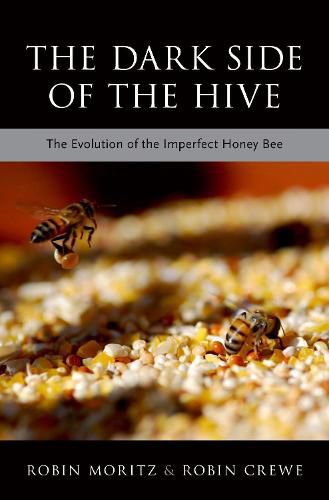Readings Newsletter
Become a Readings Member to make your shopping experience even easier.
Sign in or sign up for free!
You’re not far away from qualifying for FREE standard shipping within Australia
You’ve qualified for FREE standard shipping within Australia
The cart is loading…






Honey bees have been described as exceptionally clever, well-organized, mutualistic, collaborative, busy, efficient–in short a perfect society. While the colony is indeed a marvel of harmonious, efficient organization, it also has a considerable dark side. Authors Robin Moritz and Robin Crewe write about the life history of the honey bee, Apis mellifera, highlighting conflict rather than harmony, failure rather than success, from the perspective of the individual worker in the colony. When one looks carefully, the honey bee colony is far from being perfect. As with any complex social system, honeybee societies are prone to error, robbery, cheating, and social parasitism. Nevertheless, the hive gets by remarkably well in spite of many seemingly odd biological features. The perfection that is perceived to exist in the honeybee’s social organization is the function of a focus on the colony as a whole rather than exploring the idiosyncrasies of its individual members. The Dark Side of the Hive thus focuses on the role of the individual rather than that of the collective. Moritz and Crewe dissect the various careers that individual male and female honey bees can take and their role in colony organization. Competition between individuals using both physical and chemical force drives colonial organization. This book deals with individual mistakes, maladaptations and evolutionary dead-ends that are also part of the bees’ life. The story told about these dark sides of the colony spans the full range of biological disciplines ranging from genomics to systems biology.
$9.00 standard shipping within Australia
FREE standard shipping within Australia for orders over $100.00
Express & International shipping calculated at checkout
Honey bees have been described as exceptionally clever, well-organized, mutualistic, collaborative, busy, efficient–in short a perfect society. While the colony is indeed a marvel of harmonious, efficient organization, it also has a considerable dark side. Authors Robin Moritz and Robin Crewe write about the life history of the honey bee, Apis mellifera, highlighting conflict rather than harmony, failure rather than success, from the perspective of the individual worker in the colony. When one looks carefully, the honey bee colony is far from being perfect. As with any complex social system, honeybee societies are prone to error, robbery, cheating, and social parasitism. Nevertheless, the hive gets by remarkably well in spite of many seemingly odd biological features. The perfection that is perceived to exist in the honeybee’s social organization is the function of a focus on the colony as a whole rather than exploring the idiosyncrasies of its individual members. The Dark Side of the Hive thus focuses on the role of the individual rather than that of the collective. Moritz and Crewe dissect the various careers that individual male and female honey bees can take and their role in colony organization. Competition between individuals using both physical and chemical force drives colonial organization. This book deals with individual mistakes, maladaptations and evolutionary dead-ends that are also part of the bees’ life. The story told about these dark sides of the colony spans the full range of biological disciplines ranging from genomics to systems biology.